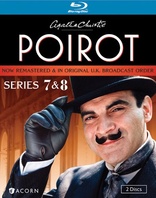Poirot: Series 7 & 8 Blu-ray Movie
HomePoirot: Series 7 & 8 Blu-ray Movie 
Acorn Media | 2000-2001 | 2 Seasons | 412 min | Not rated | Oct 01, 2013Movie rating
8.3 | / 10 |
Blu-ray rating
| Users | 0.0 | |
| Reviewer | 3.5 | |
| Overall | 3.5 |
Overview
Poirot: Series 7 & 8 (2000-2001)
When the TV dramatization of the cases of Agatha Christie's brilliant Belgian detective resumed after a four-year hiatus, most of the remaining mysteries were feature-length. The four included here are The Murder of Roger Ackroyd, Lord Edgware Dies, Evil Under the Sun and Murder in Mesopotamia.
Starring: David Suchet, Hugh Fraser (I), Philip Jackson (II), Pauline Moran, David YellandDirector: Edward Bennett (I), Andrew Grieve, Renny Rye, Brian Farnham
| Period | Uncertain |
| Mystery | Uncertain |
| Crime | Uncertain |
| Drama | Uncertain |
| Thriller | Uncertain |
Specifications
Video
Video codec: MPEG-4 AVC
Video resolution: 1080p
Aspect ratio: 1.78:1
Original aspect ratio: 1.78:1, 1.33:1
Audio
English: DTS-HD Master Audio 2.0
Subtitles
English SDH
Discs
50GB Blu-ray Disc
Two-disc set (2 BDs)
Packaging
Slipcover in original pressing
Playback
Region A (locked)
Review
Rating summary
| Movie | 4.5 | |
| Video | 2.5 | |
| Audio | 4.0 | |
| Extras | 0.0 | |
| Overall | 3.5 |
Poirot: Series 7 & 8 Blu-ray Movie Review
New Century, New Adventures, New Look
Reviewed by Michael Reuben October 1, 2013When Poirot returned to British airwaves on January 2, 2000, with The Murder of Roger Ackroyd, based on one of Agatha Christie's most celebrated novels, several things had changed after the four-year hiatus. The series had adopted the widescreen format of the new millennium's increasingly popular HDTV standard, although it would continue to be shot on film (in Super16) for several more years. The stylized Art Deco furnishings had been replaced by a more generic period decor that allowed greater flexibility as the Belgian sleuth's exploits continued to take him to far-flung locales. And the A&E Network had come aboard as a producing partner, which would have a variety of consequences. Depending on whom you ask, the four feature-length mysteries included in the latest set from Acorn Media constitute Series 8 of Poirot (according to IMDb) or Series 7 and 8 (according to Acorn and Wikipedia). However one chooses to number them, they are welcome additions to the series for fans of David Suchet's peerless incarnation of Christie's most famous crimefighter. The news on the video front isn't so favorable, but we'll get to that later.
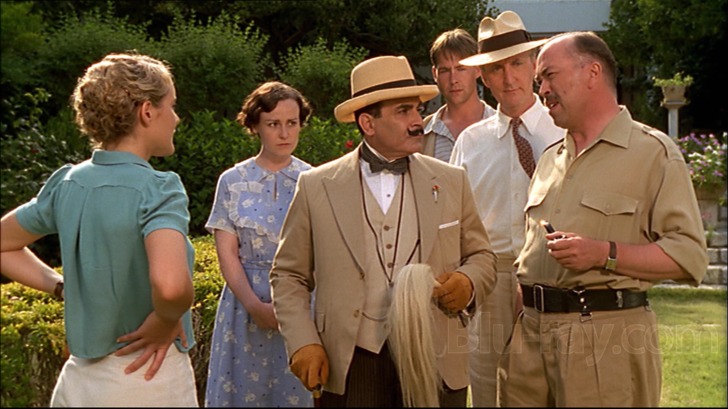
The Murder of Roger Ackroyd (disc 1) (first broadcast: Jan. 2, 2000, U.K.) Christie's novel of Roger Ackroyd is justly famous for being written in the first person by somone who turns out to be a classic "unreliable narrator". Writer Clive Exton's adaptation preserves this device by having Poirot read the journal of the murderer, which is discovered only at the story's end. The readings, in Poirot's voiceover, punctuate the drama with a style unlike any other episode of the Poirot series. Poirot is attempting to retire from detective work, having seen enough of the dark side of humanity. In the quaint country village of King's Abbott, he has taken a house and passes his days gardening. The local physician, Dr. Sheppard (Oliver Ford Davies), is an old friend, as is a wealthy industrialist, Roger Ackroyd (Malcolm Terris). All seems peaceful on the surface, but as the murderer's journal declares (and any viewer of Midsomer Murders could confirm), the serenity of the English countryside is but a mask for treachery, greed and villainy. The first sign of trouble is the suicide of a widow, Mrs. Ferrars (Rosalind Bailey), who was long rumored to have murdered her husband—a story that Dr. Sheppard's gossipy sister, Caroline (Selina Cadell), is only too eager to relate. Evidence emerges that Mrs. Ferrars was being blackmailed, perhaps about her role in her husband's death. Shortly thereafter, Roger Ackroyd is found murdered in his study, which was locked from the inside. Dr. Sheppard had seen Ackroyd earlier that evening, and he had been heard having a conversation with an unidentified person at some later point. All signs point to Ackroyd's stepson, Ralph Paton (Jamie Bamber, Battlestar Galactica), who stands to inherit the Ackroyd fortune and was being forced into a marriage with Ackroyd's niece, Flora (Flora Montgomery), that he obviously did not want. But other suspects present themselves as well. A parlour maid named Ursula Bourne (Daisy Beaumont) was summarily fired by Ackroyd on the day of his death, for reasons unknown. That same day, Ralph Paton was seen in hushed conversation with an unknown woman. And Geoffrey Raymond (Nigel Cooke), the foreman of Ackroyd's factory, had major differences with his employer over the running of the business. Poirot finds himself cast in the role of detective once more, but his burden is eased by the arrival of his old comrade, Chief Inspector Japp of Scotland Yard (Philip Jackson), who has presumably been called due to Ackroyd's stature. Of course Poirot identifies the killer, but perhaps the most emotional moment for him is a trip to London in pursuit of a lead. Poirot and Japp visit the detective's former quarters at Whitehaven Mansions, which Poirot has still kept. "Too many ghosts", says the detective, but even Japp can see that the apartment's former inhabitant will soon return. Lord Edgware Dies (disc 1) (first broadcast: Feb. 19, 2000, U.K.) Poirot has resumed residence at Whitehaven Mansions, where Miss Lemon (Pauline Moran) is busy reorganizing his files. Their old friend, Captain Hastings (Hugh Fraser), shortly rejoins them, having returned from Argentina where unsuccessful business ventures have cost him most of his capital. Shortly, however, Hastings is back in his old role assisting Poirot in a murder investigation. Lord Edgware (John Castle) is a stuffy, ill-tempered nobleman who greatly regrets marrying his second wife, Jane Wilkinson (Helen Grace), a renowned stage actress of whom his Lordship is both jealous and disapproving. The jealousy may be justified, but Lord Edgware is hardly a prize. Geraldine (Hannah Yelland), his own daughter by his first wife, detests him, and he is vicious even to his loyal secretary of many years, Miss Carroll (Leslie Nightingale), who clearly adores him. Meanwhile, Jane prefers the company of theatrical folk like her friend, Carlotta Adams (Fiona Allen), a nightclub entertainer at whose show Jane is introduced to Poirot and Hastings. Jane asks Poirot to intervene with her husband, who will not grant her a divorce, but when Poirot and Hastings visit Lord Edgware, he says he has already written to his wife agreeing to her request. When Poirot and Hastings report this to their actress client, she is so overjoyed that she accepts an invitation that she had previously declined for dinner at the home of Sir Montagu and Lady Corner (John Quentin and Janet Hargreaves). While she is seated at the table in plain view of twelve other guests, a woman claiming to be "Lady Edgware" enters the Edgware home and murders Lord Edgware. Poirot's investigation turns up multiple suspects and numerous inconsistencies, but everyone has an alibi—especially Jane Wilkinson, whose presence at the dinner party during the murder is beyond dispute. But a chance observation by Hastings catches the attention of Poirot's "little grey cells" and helps him identify the culprit. Evil Under the Sun (disc 2) (first broadcast: Apr. 20, 2001, U.K.) Any adaptation of Evil Under the Sun must reckon with the 1982 film directed by Guy Hamilton and starring Peter Ustinov, who was imposing if not exactly consistent with Agatha Christie's depiction of Poirot. Fortunately for adapter Anthony Horowitz (creator of Foyle's War), the 1982 film shifted the location to a sunny Mediterranean resort presided over by Maggie Smith's memorable landlady, who almost stole the picture from Ustinov. Horowitz sensibly restored Christie's English locale and let Poirot retain the lead role as chief eccentric among the dramatis personae. The story opens with an apparently unrelated event: the discovery of the strangled body of Alice Corrigan in the woods near a country church while its pastor, Rev. Stephen Lane (Tim Meats), preaches a fiery sermon condemning the "Jezebels" of this world. Rev. Lane appears at the inquest where Alice Corrigan's death is ruled a murder by person or persons unknown; her grief-stricken fiancé, who was initially suspected, has an ironclad alibi. The significance of these events is that Rev. Lane will be among the guests when another "Jezebel" is murdered by strangulation. In London, Poirot suffers a fainting spell at the opening of Hastings' new Argentinian restaurant. His doctor determines that he is overweight (to Poirot's consternation), and the concerned Miss Lemon bundles him off to the Sandy Cove Hotel, a health resort located on a picturesque island off the British coast. Efficient organizer that she is, Miss Lemon also insists that Hastings accompany him as nursemaid and minder. Among the guests at the hotel is a beautiful and flirtatious former actress, Arlena Stuart (Louise Delamere), who also attended the premiere of Hastings' restaurant. The widow of a much older man who left her his fortune, Arlena has married Kenneth Marshall (David Mallinson), much to the chagrin of Marshall's teenage son, Lionel (Russell Tovey). Arlena's latest infatuation is a handsome broker from London's financial district, Patrick Redfern (Michael Higgs), whose mousy wife, Christine (Tamzin Malleson), a former schoolteacher, is wildly jealous. Other guests at the hotel include the Rev. Lane, now retired from the pulpit; a retired military officer, Major Barry (Ian Thompson); a sailing enthusiast, Horace Blatt (David Timson); Kenneth Marshall's former sweetheart, Rosamund Darnley (Marsha Fitzalan); and Miss Emily Brewster (Carolyn Pickles), a gossip and busybody. Poirot senses something amiss, and his suspicions are confirmed when Patrick Redfern and Emily Brewster find Arlena Stuart strangled on the beach at remote Pixy Cove. Everyone at the resort has an alibi for the time of the murder, creating a puzzle for Poirot and for Chief Inspector Japp, who arrives from London with a squad of officers to lock down the island. Poirot eventually unravels the cold-blooded machinations by which Arlena Stuart was killed and the reasons behind the murder. In the process, he also obtains justice for Alice Corrigan and helps crack a drug smuggling ring. He receives invaluable aid from the resourceful Miss Lemon, despite her disapproval that Poirot is working on a case instead of dieting and resting, which is why she sent him to Sandy Cove in the first place. Murder in Mesopotamia (disc 2) (first broadcast: June 2, 2002, U.K.) Poirot accompanies Hastings to visit his nephew, Bill Coleman (Jeremy Turner-Welch), at an archaeological dig in Iraq. They find a location that is crawling with intrigue and subplots. Already in the opening scene, a pair of unseen hands has strangled a local drug dealer. The archaeological team is headed by Dr. Erich Leidner (Ron Berglas), whose American wife, Louise (Barbara Barnes), is something of a queen bee to all the men at the site. The Leidners have only been married a few years, because Louise has an unusual history. As a young girl, she was married to Frederick Bosner, who worked for the U.S. State Department but was found to be a spy for Germany. Sentenced to die as a traitor, Bosner escaped but died in a train wreck while fleeing. His body was identified in the wreckage. Still, whenever Louise became romantically involved with another man, she received threatening letters in her dead husband's handwriting, until she broke off the relationship. No such letter arrived when she met and married Leidner, however, but now they have started again. Other strange phenomena have occurred at the site, including ghostly apparitions outside Mrs. Leidner's room, and a stranger peering in at the window. Poirot theorizes that someone at the dig may be Bosner's younger brother, William, in disguise. Mrs. Leidner certainly has other enemies in the vicinity, including her husband's longtime colleague, Richard Carey (Christopher Bowen), whose dislike of Mrs. Leidner seems particularly intense (or so it seems to Poirot), and Sheila Maitland (Pandora Clifford), daughter of the local chief of police, Superintendent Maitland (Iain Mitchell), who has a crush on Carey but can't get his attention. Several days after Poirot and Hastings arrive, Mrs. Leidner is found dead in her room, the victim of a blow to the head with a blunt instrument. No one can find a murder weapon, and everyone seems to have an alibi. One member of the team who tells Poirot that there might be a logical explanation is murdered in an especially cruel manner before the crucial information can be imparted. In solving the murder, Poirot unmasks multiple deceptions and even breaks up an operation dealing in forged antiquities. All in a day's work for the world's greatest detective. (Note: For reasons unknown, disc 2 of this set reverses the presentation of Murder in Mesopotamia and Evil Under the Sun from their broadcast order.)
Poirot: Series 7 & 8 Blu-ray Movie, Video Quality 
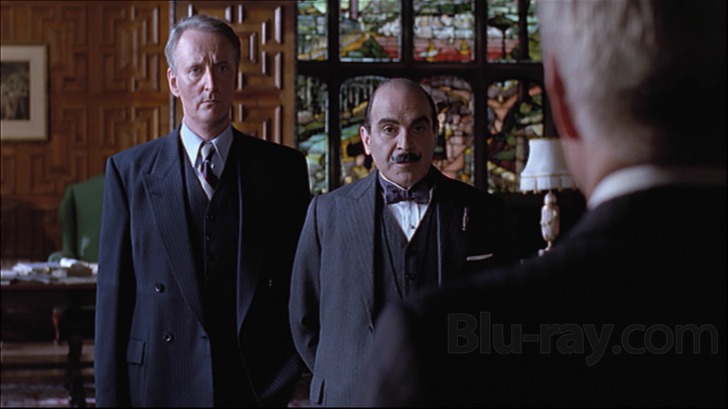
The curse of A&E strikes Poirot again. These episodes of Poirot were released on DVD by A&E Home Video in versions that were generally considered third-rate by every collector. These Blu-ray versions from Acorn Media are a marked improvement, but they pale in comparison to the superb Blu-rays (with minor issues) released by Acorn for the first six series of Poirot. Since Acorn does not prepare its own transfers, one can only conclude that a different source provided the transfers for these Blu-rays—and it shows. The colors on these 1080p, AVC-encoded discs are generally robust, vibrant and well-saturated. Black levels and contrast are adequate as well. The shortcomings appear in the areas of detail and film-like quality. Detail is merely adequate in closeups and medium shots. In long shots, it is sorely lacking; figures and even outlines of individual shapes begin to blur, and textures become indistinct and mushy. Study the movement of the film's grain, particularly in large expanses of lighter areas such as the sky, and it becomes evident that the technical crew have attempted to compensate for a weak image capture with electronic sharpening. The grain has the chunky, overemphasized texture that typically results from artificial sharpening, and some of the image mush is typical of how such manipulation bludgeons genuine detail while creating an illusion of "pop" on smaller screens. While the effect is not so pronounced as to create egregious edge halos, it has certainly done its damage. Other artifacts are also noticeable, including aliasing, dot crawl and other blemishes typical of a weak image that has been electronically processed to disguise its weaknesses. As with all such efforts, the processing merely exchanges one set of problems for another. Whether the poor image capture is the result of weak source elements, dated scans or bad workmanship, I will not speculate. But since Acorn now controls the Christie Estate, it should be in a position to demand better quality work from its licensees, especially since it is now putting its own name on the releases. Super16 elements shot in 1999 and 2000 (according to the copyright dates) should yield much better results than what appears on these Blu-rays. The results should be at least as good as what we saw on Series 1-6, and they are nowhere near that.
Poirot: Series 7 & 8 Blu-ray Movie, Audio Quality 
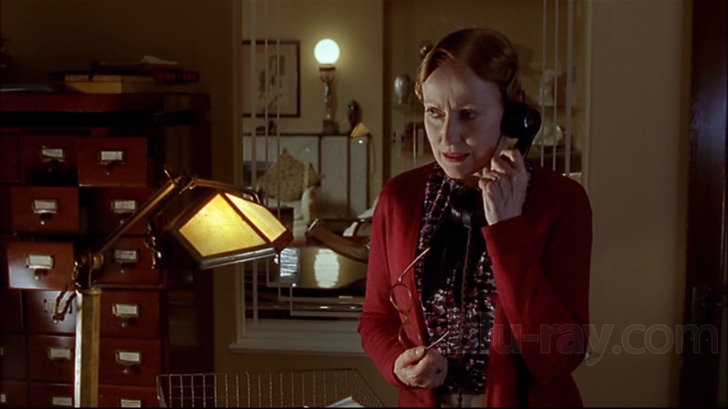
The stereo sound mixes for these four episodes are consistent with prior episodes of Poirot, except that the tracks are now presented in lossless DTS-HD MA 2.0. Dialogue is clear, sound effects are precise, and Christopher Gunning's scoring is as delightful as ever.
Poirot: Series 7 & 8 Blu-ray Movie, Special Features and Extras 
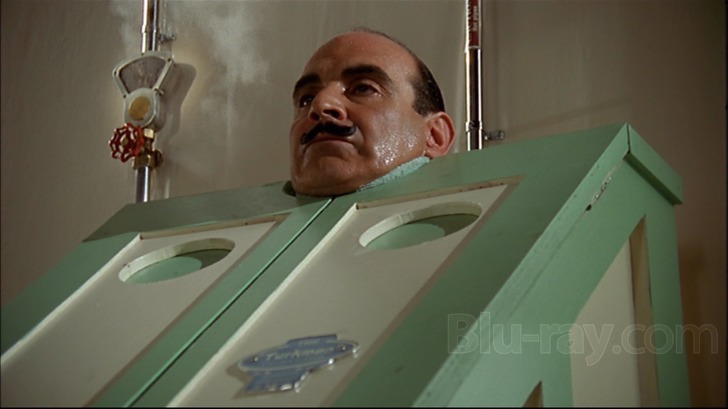
No extras are included. Disc 1 plays the usual trailer for Acorn Media at startup.
Poirot: Series 7 & 8 Blu-ray Movie, Overall Score and Recommendation 
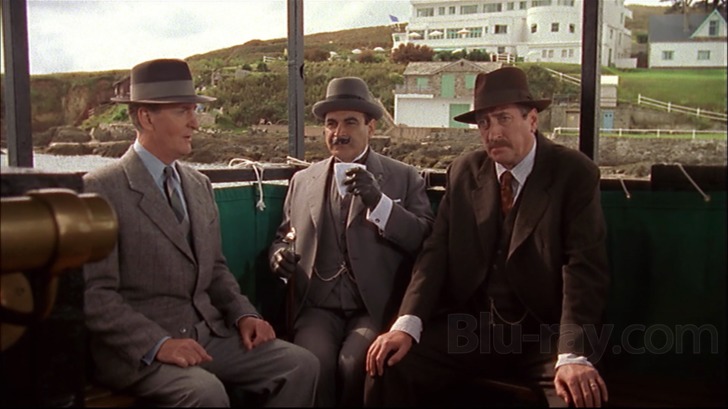
Suchet's portrayal of Hercule Poirot remains a peerless achievement. It is unfortunate that Acorn has been unable to maintain the exceptional level of quality it established with its initial releases of the Poirot series. The discerning Belgian always demands the best for himself, and he too would object to the quality of these Blu-rays. Recommended for the films. Buyer beware for the video presentation.
Other editions
Poirot: Other Seasons

Poirot: Series 1
1989

Poirot: Series 2
1990

Poirot: Series 3
1991

Poirot: Series 4
1992

Poirot: Series 5
1993

Poirot: Series 6
1995-1996

Poirot: Series 9
2003-2004

Agatha Christie's Death on the Nile
2004

Poirot: Series 10
2006

Poirot: Series 11
2008-2009

Poirot: The Movie Collection - Set 6
2009-2010

Poirot: Murder on the Orient Express
2010

Poirot: Series 12
2010-2011

Poirot: Series 13
2013
Similar titles
Similar titles you might also like
(Still not reliable for this title)

The Mirror Crack'd
1980

State of Play
2009

Murdoch Mysteries: Season 18
The Artful Detective
2024-2025

Zodiac 4K
Theatrical 4K | Director's Cut BD only
2007

Foyle's War: Set 8
2014

The Night of the Generals
Limited Edition to 3000 - SOLD OUT
1967

Murder on the Orient Express 4K
50th Anniversary Edition
1974

Miss Marple: Volume 1
The Murder at the Vicarage / The Body in the Library / The Moving Finger / A Murder is Announced
1984-1986

The Raven
2012

Murder on the Orient Express
2017

Twisted
2004

The Black Dahlia
2006

Evil Under the Sun
1982

Gosford Park
Arrow Academy
2001

Crooked House
2017

The Girl with the Dragon Tattoo
2011

The Bone Collector 4K
1999

Murder by Decree 4K
1979

Taboo: Season One
2017

L.A. Confidential
1997
